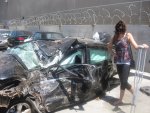I love getting emails like this (they get passed on by the Marketing folks, usually).
Hi Mr. Hughes,
I got your name from my Volt Dealer here in Orange County, CA.
I bought a 2013 Volt in November 2012 for my 20 year old daughter Caroline and we all loved it. I have a Porsche 911s and a BMW 740il. The Volt was our favorite car to drive.
On August 3[SUP]rd[/SUP], a drunk driver hit Caroline from the right rear traveling in the same direction. The drunk driver hit our Volt so hard it knocked the Volt off the road down a 15 foot embankment. Caroline in the Volt rolled several times down the embankment before hitting a tree. Caroline was taken by ambulance to a local hospital where she suffered only a black eye, arm lacerations and stitches to her left foot. Our Farmers insurance adjuster said he never saw a car that mangled without a fatality.
We are grateful to you and GM for making the Volt so safe. The fact that Caroline survived that crash was a miracle from God and the 10 Volt airbags. I am in the middle of buying another Volt right now and thought you would like to share this story with anyone else at GM or with any potential Volt buyers.
Name Removed

